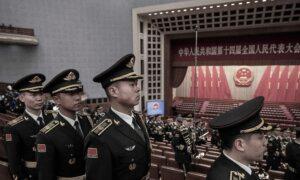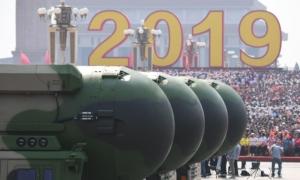‘We know that China seeks to challenge the security and economic interests of the United States…,’ Sen. Jack Reed (D-R.I.) said.
The Biden administration is seeking nearly $10 billion to build out defense capabilities aimed at countering Chinese communist aggression in the Indo-Pacific.
The administration’s proposed defense spending request for fiscal year 2025 includes $9.9 billion for the Pacific Deterrence Initiative (PDI), a congressionally mandated section of the defense budget aimed at prioritizing defense spending for the region.
Speaking at an April 9 hearing of the Senate Armed Services Committee, committee Chair Jack Reed (D-R.I.) said the request demonstrated the United States’ continued focus on strategic competition with China.
“We know that China seeks to challenge the security and economic interests of the United States and our allies and that it increasingly has the ability to do so,” Mr. Reed said.
“Keeping our competition with China front and center, this budget request includes $9.9 billion for priorities covered by the Pacific [Deterrence] Initiative.”
Mr. Reed added that he considered the funding to be vital to ensuring “strategic stability” in the Indo-Pacific by strengthening the military’s logistics networks, building allied capabilities in the region, and supporting training exercises with allies and partners.
Secretary of Defense Lloyd Austin testified before the committee that the request demonstrated the Pentagon’s continued efforts to confront China “with confidence and urgency” in the region.
“Through a $9.9 billion request for the Pacific Deterrence Initiative, the Department continues to prioritize investments in our activities and infrastructure to reinforce security and stability in the Indo-Pacific region and bolster our advantages and those of our allies and partners west of the International Date Line,” Mr. Austin said in his written testimony.
“It will continue to bolster our ability to defend our country, paced to the growing, multi-domain challenge posed by an increasingly aggressive People’s Republic of China (PRC).”
Mr. Austin also stressed that communist China was seeking “new ways to undermine U.S. interests” both in the Indo-Pacific and elsewhere and that continued effort would be required to counter its malign influence without pushing tensions into the realm of overt conflict.
Committee ranking member Roger Wicker (R-Miss.) said that the security environment in the Indo-Pacific had greatly “deteriorated” in recent years.
There was now a significant risk, he suggested, of China’s ruling communist party pursuing a conflict with democratic Taiwan. Likewise, he said, there remained a “very real prospect” that the regime could initiate a conflict with the Philippines, an ally whom the United States is treaty-bound to defend.
Given China’s rapid military buildup, including the largest nuclear proliferation since the Cold War, Mr. Wicker said the United States would need to do more than what was being asked by the Biden administration.
“China’s military production rates, advanced training improvements, and innovation strategies are troubling, and they’re stunning,” Mr. Wicker said.
Original News Source Link – Epoch Times
Running For Office? Conservative Campaign Consulting – Election Day Strategies!


